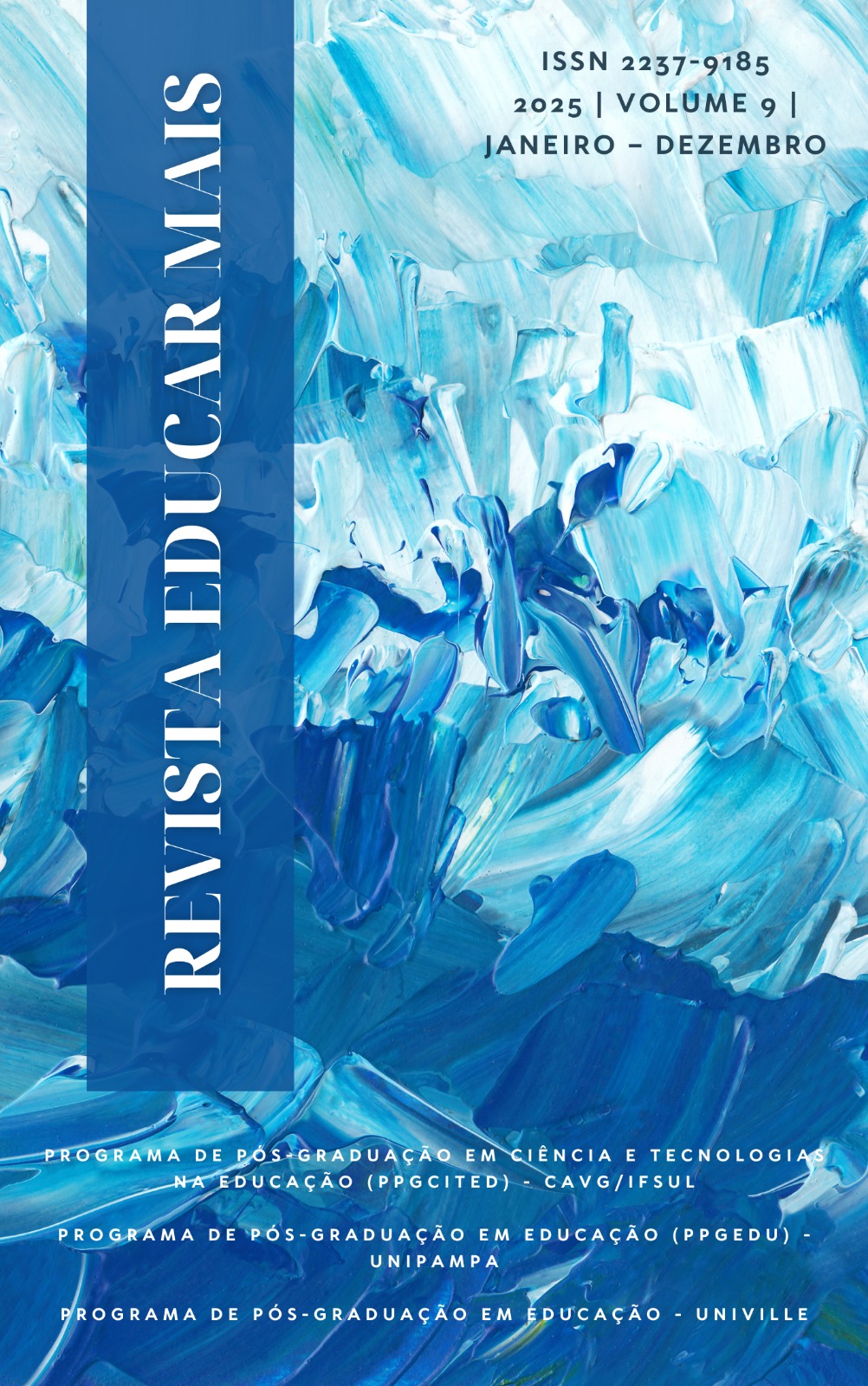Learning projects and digital technologies: reflections on teaching practice in EJA in High School
DOI:
https://doi.org/10.15536/reducarmais.9.2025.4183Keywords:
Cooperation, Youth and Adult Education, Learning Projects, Digital TechnologiesAbstract
This article presents an account of the work developed within the scope of a research project under development in the Postgraduate Program in Mathematics Teaching at UFRGS, in the research line Digital Information and Communication Technologies in Mathematics Education. The research work, in the format of a pilot experiment, sought to observe the collective work of students of the Youth and Adult Education program in High School when exploring and constructing contexts that involved learning projects. The theoretical framework used was the concept of cooperation proposed by Jean Piaget to understand how students, collectively and through a qualitative methodology involving work with learning projects, articulate and construct mathematical ideas based on the themes explored. This stage of the research took place in a public school in Porto Alegre in 2024 and used the Chromebooks® provided by the institution, making the teaching practice immersed in an interactive digital environment. Data production involved classroom observations, recordings of students' technological interactions, and, at the end, the application of a questionnaire to understand students' perceptions of the experience during the pilot experiment. Preliminary results point to challenges for the implementation of this work methodology and highlight the importance of cooperative work and student engagement as essential factors for the construction of knowledge. During the next stages of the project, we hope to contribute with reflections on the improvement of teaching practices in Youth and Adult Education, with emphasis on the potential use of the Learning Projects methodology combined with the use of digital technologies in the classroom.
Downloads
References
COGO, A. L. P.; BECKER, M. L. R. Cooperação em Piaget: uma teoria na educação à distância em enfermagem. In: Congresso Brasileiro de Informática em Saúde (9.: 2004: Ribeirão Preto). Anais. Ribeirão Preto: CBIS, 2004. 1 CD-ROM. 2004.
D’AMBROSIO, B. H. Formação de professores de matemática para o século XXI: o grande desafio. Pro-Posições, Campinas, SP, 1993, v. 4, n. 1, p. 35–41.
DE CASTRO, R. M.; LANZI, L. A. C. O futuro da escola e as tecnologias: alguns aspectos à luz do diálogo entre Paulo Freire e Seymour Papert. Revista Ibero-Americana de Estudos em Educação, p. 1496-1510, 2017.
FIORENTINI, D. A formação matemática e didático-pedagógica nas disciplinas da licenciatura em matemática. Revista De Educação. PUC-Campinas, (18). 2005. Disponível em: https://seer.sis.puc-campinas.edu.br/reveducacao/article/view/266. Acesso em: 15 fev. 2025.
GOMES, N. Uma proposta para a educação de jovens e adultos baseada na metodologia de projetos de aprendizagem. 83p. 2021. Trabalho de Conclusão de Curso (Curso de Mestrado Profissional em Educação) - Universidade Federal do Pampa, Campus Jaguarão, Jaguarão, 2021.
GUIMARÃES, N. L. C. et al. O papel da cooperação nos processos coletivos para resolução de problemas. Revista Educação Matemática Pesquisa. São Paulo. Vol. 23, n. 1 (2021), p. 473-498, 2021.
LAVILLE, C.; DIONNE, J. A construção do saber. Belo Horizonte: UFMG, v. 340, p. 1990, 1999.
MORAIS, A. D.; FAGUNDES, L. C.; MATTOS, E. B. V. A matemática do Squeak Etoys e educação matemática: uma perspectiva de projetos de aprendizagem. In: CONGRESSO INTERNACIONAL DE INFORMÁTICA EDUCATIVA TISE, 2013, Fortaleza, v. 18, p. 375-383.
NICOLINI, C. A. H. et al. Projetos de aprendizagem e educar pela pesquisa como prática de cidadania. 2006.
PAZETTI, M. V. Construção do conhecimento de funções a partir do desenvolvimento de projetos de aprendizagem 67p. 2015. Trabalho de Conclusão de Curso (Curso de Licenciatura em Matemática) - Universidade Federal do Rio Grande do Sul, Porto Alegre, 2015.
PIAGET, J. Estudos sociológicos, Rio de Janeiro: Forense. 1973.
SILVA, R. S. da; CORRÊA DA ROSA, M. Projetos de aprendizagem na Matemática escolar: uma revisão sistemática de literatura. Revista Educar Mais, [S. l.], v. 9, p. 1–14, 2025. DOI: 10.15536/reducarmais.9.2025.4097. Disponível em: https://periodicos.ifsul.edu.br/index.php/educarmais/article/view/4097. Acesso em: 5 jul. 2025.
ZANETTE, M. S. Pesquisa qualitativa no contexto da Educação no Brasil. Educar em Revista, p. 149-166, 2017.
Downloads
Published
How to Cite
Issue
Section
License
Copyright (c) 2025 Rodrigo Sychocki da Silva, Mauricio Corrêa da Rosa

This work is licensed under a Creative Commons Attribution-NonCommercial 4.0 International License.
DECLARATION OF RESPONSIBILITY: I hereby certify that I partially or fully participated in the conception of the work, that I did not hide any links or financial agreements between the authors and companies that may be interested in this article publication. I certify that the text is original and that the work, partially or fully, or any other work with a substantially similar content written by me, was not sent to any other journal and it will not be send while my submission is being considered by Revista Educar Mais, whether in printed or electronic format.
The author responsible for the submission represents all the authors of the manuscript and, when sending the article to the journal, guarantees s/he has obtained the permission to do so, as well as s/he guarantees the article does not infringe upon anyone’s copyright nor violate any proprietary rights. The journal is not responsible for the opinions expressed.
Revista Educar Mais is Open Access, does not charge any fees, whether for submission or article processing. The journal adopts Budapest Open Access Initiative (BOAI)’s definition, i.e., any users are permitted to read, download, copy, distribute, print, search and link to the full texts of these articles.
All the articles are published under the Creative Commons Atribuição-NãoComercial 4.0 Internacional license. The authors keep the copyright of their production. That way, they must be contacted directly if there is any interest in commercial use of their work.
















